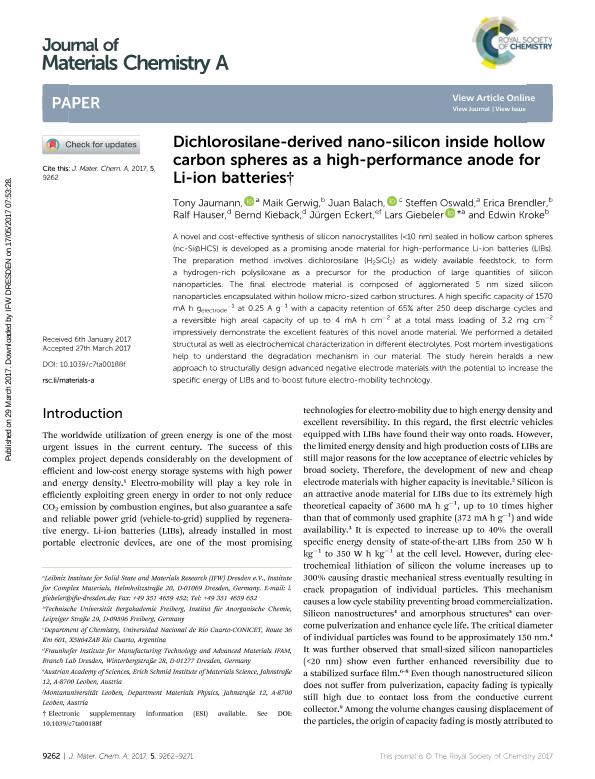Mostrar el registro sencillo del ítem
dc.contributor.author
Jaumann, Tony

dc.contributor.author
Gerwig, Maik
dc.contributor.author
Balach, Juan Manuel

dc.contributor.author
Oswald, Steffen
dc.contributor.author
Brendler, Erica
dc.contributor.author
Hauser, Ralf
dc.contributor.author
Kieback, Bernd
dc.contributor.author
Eckert, Jürgen
dc.contributor.author
Giebeler, Lars

dc.contributor.author
Kroke, Edwin
dc.date.available
2021-05-20T18:03:45Z
dc.date.issued
2017-03
dc.identifier.citation
Jaumann, Tony; Gerwig, Maik; Balach, Juan Manuel; Oswald, Steffen; Brendler, Erica; et al.; Dichlorosilane-derived nano-silicon inside hollow carbon spheres as a high-performance anode for Li-ion batteries; Royal Society of Chemistry; Journal of Materials Chemistry A; 5; 19; 3-2017; 9262-9271
dc.identifier.issn
2050-7496
dc.identifier.uri
http://hdl.handle.net/11336/132388
dc.description.abstract
A novel and cost-effective synthesis of silicon nanocrystallites (<10 nm) sealed in hollow carbon spheres (nc-Si@HCS) is developed as a promising anode material for high-performance Li-ion batteries (LIBs). The preparation method involves dichlorosilane (H2SiCl2) as widely available feedstock, to form a hydrogen-rich polysiloxane as a precursor for the production of large quantities of silicon nanoparticles. The final electrode material is composed of agglomerated 5 nm sized silicon nanoparticles encapsulated within hollow micro-sized carbon structures. A high specific capacity of 1570 mA h gelectrode-1 at 0.25 A g-1 with a capacity retention of 65% after 250 deep discharge cycles and a reversible high areal capacity of up to 4 mA h cm-2 at a total mass loading of 3.2 mg cm-2 impressively demonstrate the excellent features of this novel anode material. We performed a detailed structural as well as electrochemical characterization in different electrolytes. Post mortem investigations help to understand the degradation mechanism in our material. The study herein heralds a new approach to structurally design advanced negative electrode materials with the potential to increase the specific energy of LIBs and to boost future electro-mobility technology.
dc.format
application/pdf
dc.language.iso
eng
dc.publisher
Royal Society of Chemistry

dc.rights
info:eu-repo/semantics/openAccess
dc.rights.uri
https://creativecommons.org/licenses/by-nc-sa/2.5/ar/
dc.subject
SILICON ANODE
dc.subject
HOLLOW CARBON SPHERES
dc.subject
HIGH PERFORMANCE
dc.subject
LI-ION BATTERY
dc.subject.classification
Físico-Química, Ciencia de los Polímeros, Electroquímica

dc.subject.classification
Ciencias Químicas

dc.subject.classification
CIENCIAS NATURALES Y EXACTAS

dc.title
Dichlorosilane-derived nano-silicon inside hollow carbon spheres as a high-performance anode for Li-ion batteries
dc.type
info:eu-repo/semantics/article
dc.type
info:ar-repo/semantics/artículo
dc.type
info:eu-repo/semantics/publishedVersion
dc.date.updated
2021-05-11T18:15:48Z
dc.journal.volume
5
dc.journal.number
19
dc.journal.pagination
9262-9271
dc.journal.pais
Reino Unido

dc.description.fil
Fil: Jaumann, Tony. Leibniz Institute for Solid State and Materials Research; Alemania
dc.description.fil
Fil: Gerwig, Maik. Technische Universität Bergakademie Freiberg; Alemania
dc.description.fil
Fil: Balach, Juan Manuel. Universidad Nacional de Rio Cuarto. Facultad de Ciencias Exactas Fisicoquímicas y Naturales. Departamento de Química y Física; Argentina. Consejo Nacional de Investigaciones Científicas y Técnicas. Centro Científico Tecnológico Conicet - Córdoba; Argentina
dc.description.fil
Fil: Oswald, Steffen. Leibniz Institute for Solid State and Materials Research; Alemania
dc.description.fil
Fil: Brendler, Erica. Technische Universität Bergakademie Freiberg; Alemania
dc.description.fil
Fil: Hauser, Ralf. Fraunhofer Institute for Manufacturing Technology and Advanced Materials; Alemania
dc.description.fil
Fil: Kieback, Bernd. Fraunhofer Institute for Manufacturing Technology and Advanced Materials; Alemania
dc.description.fil
Fil: Eckert, Jürgen. Erich Schmid Institute of Materials Science; Austria. Montanuniversität Leoben; Austria
dc.description.fil
Fil: Giebeler, Lars. Leibniz Institute for Solid State and Materials Research; Alemania
dc.description.fil
Fil: Kroke, Edwin. Technische Universität Bergakademie Freiberg; Alemania
dc.journal.title
Journal of Materials Chemistry A
dc.relation.alternativeid
info:eu-repo/semantics/altIdentifier/doi/https://pubs.rsc.org/en/content/articlelanding/2017/ta/c7ta00188f
dc.relation.alternativeid
info:eu-repo/semantics/altIdentifier/doi/http://dx.doi.org/10.1039/C7TA00188F
Archivos asociados
